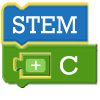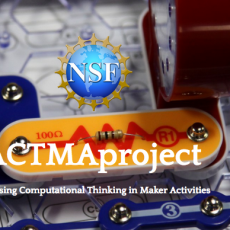Computing has become an integral part of everyday practice within modern fields of science, technology, engineering, and math (STEM). As a result, the STEM+Computing Partnerships (STEM+C) program seeks to advance new approaches to, and evidence-based understanding of, the integration of computing in STEM teaching and learning. ‘Making’ is an emerging movement in which kids use technological tools to create hardware and software that solves personally relevant problems, using things like programmable circuit boards, arts and craft materials, and computers. Building on a broad set of maker spaces in Chicago, the Assessing Computational Thinking in Making Activities (ACTMA) project will develop curricula and assessments to see how kids can learn physics and computation through making. Experts in educational measurement, in broadening STEM participation, and in instructing makers will work together with kids to design materials that are culturally responsive to girls, Hispanic-Americans, and African-Americans. By building and testing these curricula, the project will further our understanding of what kids are actually learning in informal maker spaces; how better to link maker activities to computer science and physics education; and will help provide actionable assessments that parents, informal educators, and researchers can use to help improve learning environments like maker spaces.
The intellectual merit of this project lies in two thrusts; first, the project will help to better understand existing student practices around physics and computation, in a culturally diverse, mature set of maker-oriented informal learning environments. Qualitative analysis based on Weintrop’s computational thinking framework and Lewins’ generalized qualitative analysis codes will identify target curricular goals through Charmaz’s grounded theory process. The second thrust will provide both iterated curricular designs and learning assessments that are culturally responsive, based on the practices and learning goals identified in the first thrust. The curriculum will be iteratively designed using youth informants to ensure cultural responsiveness and validity. The assessments will also be iteratively developed, relying on practitioner observations which can target ‘moments of notice’ in which an educator-friendly rubric would allow instructors to observe evidence of learning (both in the subject domain knowledge, and in computational thinking practices, aligned with emerging standards from ISTE and CSTA). An external evaluator will gauge the use and cultural sensitivity of the curriculum and assessments. The broader impacts of the project will relate to the use of the curriculum and assessments in the Center for College Access and Success partners around Chicago, and potentially its uptake in makerspaces across the country. An additional potential broader impact is increasing our ability to design and assess the success of makerspaces for STEM learning, and even broadening participation in STEM by providing learning activities that are specifically designed to appeal to a number of underrepresented groups (girls, racial minorities, and ethnic minorities.)



